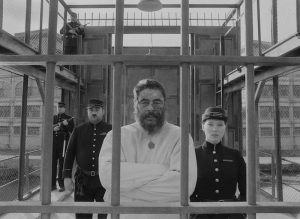If Wes Anderson were a medieval knight, he’d be Sir Wes the Whimsical.
Or something like that.
With such films as “Rushmore,” “The Royal Tenenbaums” and “The Grand Budapest Hotel,” Anderson has revealed an odd, understated humor that’s distinctly his own. He’s a genuine auteur who presents his smart, offbeat stories with a sharp eye for finely detailed, static compositions that give moviegoers the impression they’re paging through a book of children’s fairy tales – only geared for adults. Seemingly with every shot, there’s so much to take in that you’re likely to miss something.
Twenty minutes into his latest film, “The French Dispatch” (R, 108 minutes, in theaters), I was already writing in my reporter’s notebook, “I want to see it again.”

“The French Dispatch” features an all-star cast that includes, from left, Elisabeth Moss, Owen Wilson, Tilda Swinton, Fisher Stevens and Griffin Dunne. (Searchlight Pictures)
In Anderson’s film, The French Dispatch is a magazine based in Ennui, France, and distributed by the Liberty, Kansas Evening Sun newspaper. The fictional Dispatch is inspired by The New Yorker, and its characters are based, at least in part, on such editors and writers as Harold Ross, William Shawn, Lillian Ross and James Baldwin. Like its real-life counterpart, The French Dispatch is geared toward a sophisticated readership concerned with art, politics and culture.
The film unfolds as an anthology, as it depicts, one after another, articles in an edition of the magazine. These include a story about life on the streets of Ennui from a reporter (Owen Wilson) who travels by bicycle; a piece by an art writer (Tilda Swinton) about an imprisoned artist (Benicio Del Toro), discovered by a noted dealer (Adrien Brody) and whose muse is his prison guard (Lea Seydoux); a report by a journalist (Frances McDormand) detailing the activities of student revolutionaries (Timothee Chalamet and Lynda Khoudri); and a story by a noted food critic (Jeffrey Wright) about the private dining room, complete with its own chef (Stephen Park), of the city police commissioner (Mathieu Amalric).
Pulling all of this together is no-nonsense founder-editor Arthur Howitzer Jr. (Bill Murray), whose advice to writers is “Make it sound like you wrote it that way on purpose” and whose No. 1 rule for his staff is “No crying.”

Benicio del Toro and Lea Seydoux, both in foreground, appear in “The French Dispatch.”
(Searchlight Pictures)
Typical of Anderson, everything in “The French Dispatch” is presented with a deadpan seriousness that makes the ongoing absurdity that much more, well, absurd (in the best sense). And given Anderson’s formidable imagination, it’s next to impossible to guess what will happen next in his clever vignettes.
If there’s one weakness here, it’s that the pieces never add up to much as a whole. That’s always a challenge with the anthology approach, and the film does succeed in presenting a consistent style that reflects both The New Yorker and Wes Anderson. But the ending, intended to pull things together, doesn’t quite have a strong enough impact.
Still, that’s a mere quibble considering this film’s many virtues.
Can’t wait to see it again. ***½ (out of four)
‘Dune’ a sci-fi snooze
From the get-go, you’re supposed to feel the gravity and grandiosity of “Dune” (PG-13, 155 minutes, in theaters and on HBO Max).
There’s no buildup. You’re supposed to be immediately impressed, immediately involved.
This is the latest attempt to adapt Frank Herbert’s classic 1965 sci-fi novel for the big screen. Most infamously, David Lynch tried it in 1984, and the result was a campy debacle. Now it’s director Denis Villeneuve’s turn, and his version is an improvement over the Lynch film (faint praise), but it’s not nearly as good as it would have you believe.
Set in 10191, “Dune” is mostly set on the desert planet Arrakis, which, among other things, is known for brutally hot temperatures, monstrous sandworms and a super-valuable substance known as spice. Arrakis also is at the center of a power struggle involving an emperor, rival houses of Atreidis (the good guys) and Harkonnen (very bad guys) and a rebellious desert-dwelling group known as Fremen.
Timothee Chalamet (yes, him again) stars as the central character, Paul Atreidis, son of Leto (Oscar Isaac), Duke of Atreidis, and Leto’s concubine, Lady Jessica (Rebecca Ferguson). Paul is suspected to be a messianic figure, as indicated by his prophetic dreams and nascent supernatural powers.
There’s a lot more – and I do mean a lot more – in the mix, to the point that a glossary, a roadmap and a copy of Who’s Who in Dunesville could be a tremendous help to any moviegoer struggling to keep up with things. (Also in the cast: Javier Bardem, Stellan Skarsgard, Zendaya, Josh Brolin, Dave Bautista, Jason Mamoa and Charlotte Rampling.)
Considering how convoluted the plot is, Villeneuve, who also worked on the screenplay with others, does a decent job of dishing out information (though, for those who feel like it, a second viewing can be helpful).
The major problem with the film is how difficult it is to feel the intended gravity of the proceedings. Hans Zimmer’s blaring, exotic music is great in itself, and the cinematography and production design provide a visual grandeur to the film. But the story and the characters never live up to this presentation. Part of it might be their familiarity; there’s a lot of “Star Wars” and “Game of Thrones” in this movie. This seems a watered-down variation.
For instance, there’s a climactic battle in which Paul must prove himself. The thing is, rather than his opponent being someone important or intimidating, he’s more or less arbitrary. The character could be identified as “Random Dude.” As a result, this big fight is underwhelming.
And that pretty much sums up “Dune” as a whole.
Well, at least Part 1. The saga will continue. **
Tim Miller is a Cape-based member of the Boston Society of Film Critics. He and Tony Raine host “Tim ’n’ Tony’s Rock ’n’ Pop Show” from midnight to 2 a.m. Sunday nights/Monday mornings on WOMR (92.1-FM), WFMR (91.3-FM) and womr.org (archived shows at https://womr.org/schedule/broadcast-archive/). He also teaches film at Cape Cod Community College in West Barnstable. You can contact Tim at [email protected] or follow him onTwitter @TimMillerCritic. Or you can ignore him completely.
































